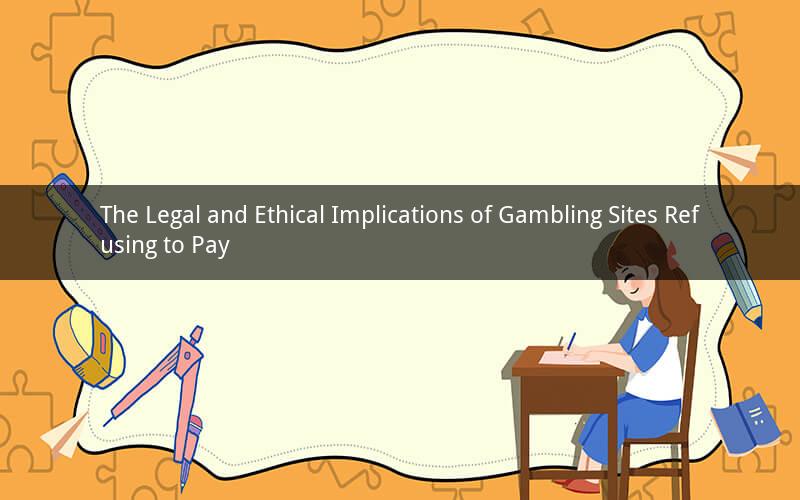
Introduction:
The world of online gambling has become increasingly popular, with numerous websites offering a variety of games and opportunities for players to win money. However, one of the most controversial issues surrounding online gambling is when gambling sites refuse to pay winnings to their players. This article explores the legal and ethical implications of such actions, providing insight into the reasons behind these decisions and the potential consequences for both the gambling sites and their customers.
Reasons for Refusing to Pay:
1. Account Fraud: One of the primary reasons why gambling sites may refuse to pay winnings is due to account fraud. If a player is found to be using stolen or fake identities, the site may have no choice but to refuse the payout. This is to protect the site from potential legal issues and financial losses.
2. Terms and Conditions Violations: Many gambling sites have strict terms and conditions that players must adhere to. If a player violates these conditions, such as trying to cash out winnings before meeting the required playthrough requirements, the site may refuse to pay.
3. Technical Issues: Sometimes, technical issues can prevent a gambling site from paying out winnings. This could be due to errors in the software, payment processing problems, or other technical glitches. In such cases, the site may temporarily suspend payments until the issue is resolved.
4. Unusual Behavior: Gambling sites often monitor player activity for signs of unusual behavior, such as rapid wins or losses. If a site suspects that a player is engaging in fraudulent activities or using illegal methods to win, they may refuse to pay the winnings.
5. Compliance with Local Laws: In some cases, gambling sites may refuse to pay winnings to comply with local laws and regulations. This could be due to restrictions on gambling in certain countries or the need to follow anti-money laundering laws.
Legal Implications:
1. Breach of Contract: When a gambling site refuses to pay winnings, it may be considered a breach of contract. Players who have entered into a legally binding agreement with the site may have grounds to take legal action if their winnings are not paid.
2. Consumer Protection Laws: Many countries have consumer protection laws that require businesses to provide services in good faith. If a gambling site is found to be refusing payments without a valid reason, they may be subject to legal action under these laws.
3. Financial Regulations: Gambling sites are often subject to financial regulations that require them to comply with anti-money laundering and know-your-customer (KYC) policies. If a site is found to be violating these regulations, they may face penalties or legal action.
Ethical Implications:
1. Trust and Reputation: Refusing to pay winnings can severely damage a gambling site's trust and reputation. Players may feel betrayed and lose faith in the site, leading to a loss of customers and potential legal action.
2. Fairness and Transparency: Ethical gambling sites prioritize fairness and transparency. Refusing to pay winnings without a valid reason goes against these principles, as it can be seen as an attempt to deceive or exploit players.
3. Social Responsibility: Gambling sites have a social responsibility to ensure that their players are treated fairly. Refusing to pay winnings can be seen as a failure to fulfill this responsibility, leading to negative consequences for the entire gambling industry.
Questions and Answers:
Q1: Can players take legal action against a gambling site that refuses to pay their winnings?
A1: Yes, players may have grounds to take legal action against a gambling site that refuses to pay their winnings. This can be done by filing a lawsuit in a court of law, seeking damages for breach of contract or other legal violations.
Q2: Are there any specific regulations that protect players from gambling sites refusing to pay winnings?
A2: Yes, many countries have specific regulations that protect players from such actions. These regulations often require gambling sites to adhere to strict terms and conditions, and may provide players with a mechanism to seek redress if their winnings are not paid.
Q3: How can players protect themselves from the risk of a gambling site refusing to pay their winnings?
A3: Players can protect themselves by researching and choosing reputable gambling sites, reading and understanding the terms and conditions of the site, and keeping detailed records of their activity and winnings.
Q4: What are the consequences for a gambling site that refuses to pay winnings without a valid reason?
A4: The consequences for a gambling site that refuses to pay winnings without a valid reason can be severe. This can include legal action, fines, and damage to the site's reputation, as well as the potential loss of customers.
Q5: How can players report a gambling site that refuses to pay their winnings?
A5: Players can report a gambling site that refuses to pay their winnings by contacting the relevant regulatory authority in their country. They can also seek assistance from consumer protection organizations or legal professionals who specialize in online gambling disputes.